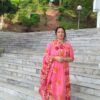Sehar talks about Urdu, the language of emotions. She talks of Ibn Safvi, an Urdu writer from Kareli, a locality in Allahabad, who was acclaimed by Agatha Christie. Here’s an interesting narrative, in the weekly column, exclusively in Different Truths.
When Javed Akhtar was asked to compose an Aarti (religious hymn), the director the film taken aback to read something where the names of Lord Krishna were used aptly and creatively. In one of his interviews during the last year’s Lucknow Literature Festival, he stated:
“Urdu is the language of north India, which like any other language should not be divided on religious  lines”
lines”
The language has not only stood strong against the sands of time but has also passed the test of extremism. Shunned by many, loved by too many, the language of Urdu has a presence in North India which cannot be ignored. It is present in the roots of our cultural diversity and national integration. The festival celebrating the love of Urdu in people is a prolific example of the fact that Urdu might be neglected it cannot be ignored.
In her recent article on Urdu, the celebrated write Rakshanda Jalil spoke about how Urdu is the language of emotions. She states that Urdu is used by  most of us as an instinct and involuntarily while we talk. It the most sought after tool for lovers who wish to express a multutde of emotions. A simple click or two on the internet and there you have a couplet (shayr) to suit your mood.
most of us as an instinct and involuntarily while we talk. It the most sought after tool for lovers who wish to express a multutde of emotions. A simple click or two on the internet and there you have a couplet (shayr) to suit your mood.
“We know, for instance, that Urdu comes to the aid of many a lover wanting to express undying love for the beloved; a random search on the internet will throw up phenomenally large numbers of Urdu verses — good, bad, indifferent — to convey the many moods and moments ranging from visaal (union) to firaaq (separation), and from ishq-e haqiqi (divine love) to ishq-e majazi (worldly love). But then Urdu catches us unawares in other guises too. For instance, when agitationists both north and south of the Vindhyas — be they University teachers or factory workers — declare ‘Inquilab Zindabad!’ (‘Long Live the Revolution!’), they are simply echoing the cry of Hasrat Mohani, the maverick Urdu poet who wrote sweetly lyrical ghazals in the chestiest metre such as ‘Chupke chupke raat din ansu bahana yaad hai’ (‘I remember the silent tears you shed day and night’) and also invoked this revolutionary slogan at a factory workers’ rally, in Calcutta, in December 1925.”
(As published in the Indian Express on January 7, 2017)
My own experiments with Urdu began at a young age. Being a part of a family with individuals that have an inclination towards understanding and learning languages, I witnessed my two grandmothers  spending their mornings reading the Urdu newspaper and afternoons with Pakeezah Aanchal (a fortnightly Urdu magazine). My mother would often speak about her childhood, which was spent reading Enid Blyton from the West, Khilona(toys) children’s magazine, Banno (lady) women’s magazine and Shama (lamp) entertainment magazine published in Urdu and Jasoosi Duniya (secretive world) a novel which is still available in our city.
spending their mornings reading the Urdu newspaper and afternoons with Pakeezah Aanchal (a fortnightly Urdu magazine). My mother would often speak about her childhood, which was spent reading Enid Blyton from the West, Khilona(toys) children’s magazine, Banno (lady) women’s magazine and Shama (lamp) entertainment magazine published in Urdu and Jasoosi Duniya (secretive world) a novel which is still available in our city.
Speaking about Jasoosi Duniya, I remember Prof. Lalit Joshi, narrating to us stories during one of the meetings of Sanchaari, a socio-cultural organisation of Allahabad.
Once the celebrate writer, Agatha Christie was asked how do you feel when you are titled as the best writer in the crime and mystery genre  of novels, she paused for a bit and said, “Well it’s not me who is the best in this genre, it is Mr. Ibn Safvi from India, who is most sought after writer of the age when it comes to writing on detective mysteries and crime”.
of novels, she paused for a bit and said, “Well it’s not me who is the best in this genre, it is Mr. Ibn Safvi from India, who is most sought after writer of the age when it comes to writing on detective mysteries and crime”.
Stunned I was, thinking how a man sitting in Kareli, a locality in Allahabad, sketched characters who solved travellers to parts of the world he had never visited – Russia, Germany, etc.
On popular demand, his novels – Jasoosi Duniya have been brought back into circulation by a renowned publishing house and are available in the one of the sought after bookstores of Allahabad.
Well, that’s the power of a language so superfluous as Urdu and the writer, who is gifted with the tool of imagination and creativity.
©Sehar Siddiqui
Photos from the interent.
#UrduPoetry #UrduMagzine #JavedAktar #RakshandaJalil #JasusiDuniya #Imagination #VernacularWriters #DifferentTruths



 By
By

 By
By